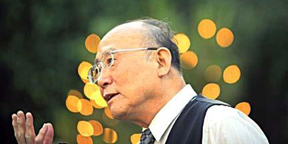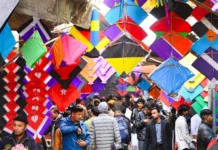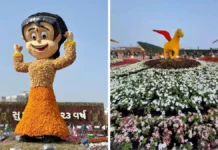
NEW DELHI: For 75-year-old Chinese poet Zhang Shixuan, composing verses in Urdu is a passion and over the past five decades his love for the language has grown manifold.
The couplets he recited at the 17th annual Jashn-e-Bahaar mushaira here evinced much interest among those present at the event.
“Toot jaata hai qalam, harf magar rehta hai, paaon chalte hain magar naqsh thair jaata hai (The pen breaks but words stay, feet keep moving but their impressions remain),” read one of them.
“It was in 1963, I was in the third year of my graduation when I was told by the government to study Urdu as China wanted to establish closer ties with India and Pakistan.
Initially I felt bad as journalism was my passion but as I started studying the language, I fell in love with it,” Zhang told PTI in an interview here.
Zhang, who has adopted the pen name Intekhab Alam which is the Urdu translation of his Chinese name, said he studied the language for four years with a group of seven students that also included a girl whom he later married.
The group studied Urdu at the Beijing Broadcasting Institute now known as the Communication University of China.
Zhang later went on to become the editor of China Pictorial monthly magazine’s Urdu edition.
Zhang, who has participated in the annual Jashn-e-Bahaar mushaira four times, said, “When I got a complete grip over the language, I started composing verses in Urdu. What started as a compulsion became a passion later and I fell in love with Urdu.”
He wrote his first ‘nazm’ (Urdu poem in rhyming verse) in 1979 saddened by the execution of then Pakistan Prime Minister Zulfiqar Ali Bhutto.
From 1967-1999 he worked for the China Pictorial’s Urdu edition and was its editor for the major part of the period.
The magazine closed down a year before his retirement due to financial constraints.
China Pictorial was first published in 1950. It was one of four publications allowed during the Cultural revolution in China. In addition to the Chinese edition, it was published in many languages including Hindu, English, Urdu, Japanese, French, German, Russian among others. Urdu edition was discontinued.
Asked if Urdu could become a link language like English or some of the other international languages, he said “Urdu in the present times is lagging behind as a working language for economic gains so it is important to harness and nurture the language with love. Only love for the language can help it in spreading it to different corners of the world.”
“Urdu has history, it has philosophy, it has culture just like the Chinese language. If you leave this language you will get distant from your history which is very dangerous. You have to love Urdu. It is a language that native people and those coming from outside and settling there have together made so it does not belong to any religion or community. It belongs to everyone,” Zhang said.
According to him, not many people knew Urdu in China when he started out.
“People in Xinjiang had an interaction with Pakistanis. There, people knew the language. Though now also not many people know Urdu in China but it is taught in three universities and many people have become interested in the language,” he said.
Zhang said he and his wife have given a lifetime to Urdu and initially he had to sacrifice a lot to study the language.
“After studying journalism, I had to quit it without completing it. During the four years that I studied Urdu, my family supported me a lot. My grandfather and grandmother died during those four years and my family did not inform me as there were financial constraints and they knew that I would not be able to afford the train ticket to visit my home in Shaanxi province. I did not go home for four years that I studied the language,” he said.
Asked about his favorite poet, he said though he likes Ghalib, Allama Iqbal, Sheikh Ibrahim Zauq his favorite is Faiz Ahmad Faiz.
He said though his mother tongue and the environment he was living was alien to the language, Urdu was easy for him to learn.
Zhang said only his wife Li Keli, whose name in Urdu is Sabira Sultana, and he learnt the language but laments that his son and daughter do not understand it.
He said mushairas still excite him and he has been around the globe to take part in them from India, Pakistan, Dubai to Los Angeles.
“Waqt dariya hai koi jheel nahi hai Alam. Raah mein gham ho, khushi ho ye guzar jayega. (Time is like a river and not like a lake. Sadness, happiness will also pass),” he signed off. -PTI






